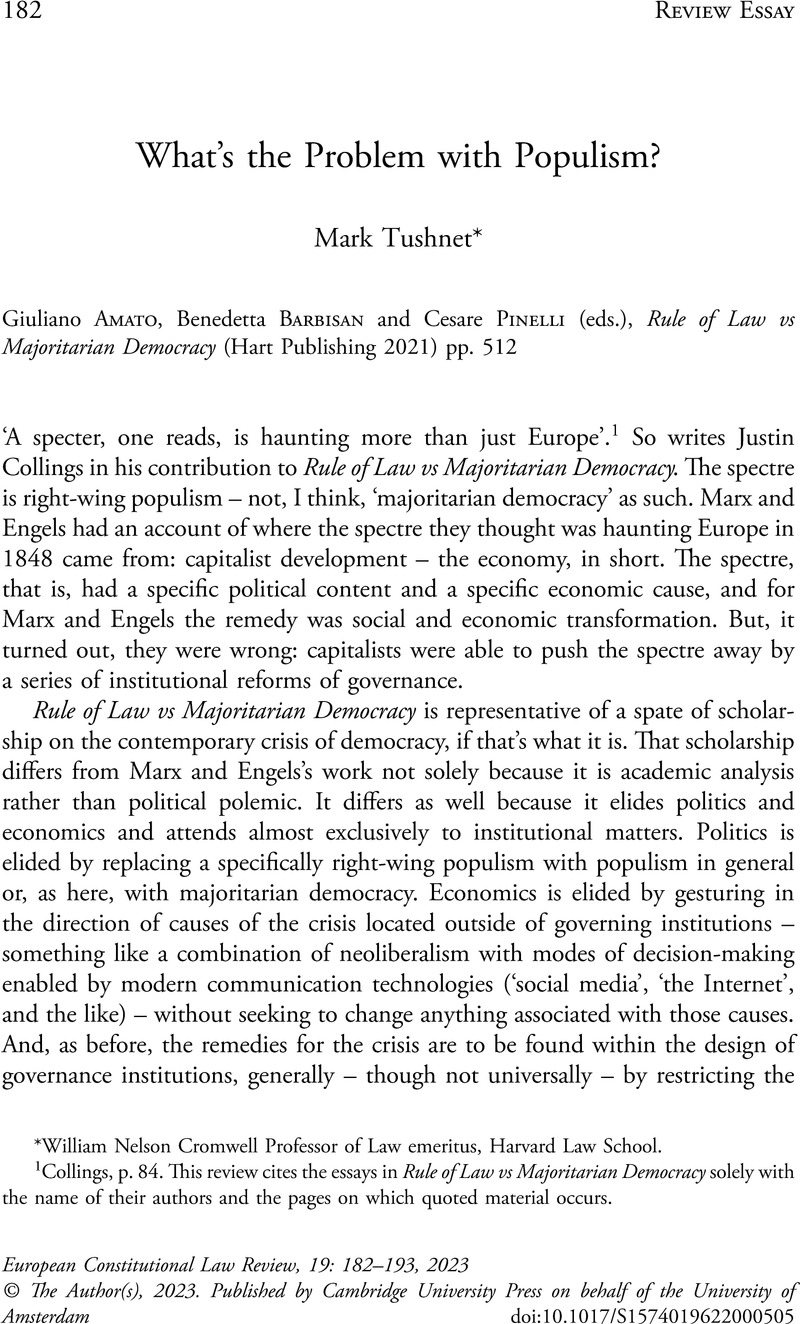No CrossRef data available.
Article contents
What’s the Problem with Populism?
Review products
Published online by Cambridge University Press: 16 February 2023
Abstract

- Type
- Review Essay
- Information
- Copyright
- © The Author(s), 2023. Published by Cambridge University Press on behalf of the University of Amsterdam
References
1 Collings, p. 84. This review cites the essays in Rule of Law vs Majoritarian Democracy solely with the name of their authors and the pages on which quoted material occurs.
2 There are a handful of references to Syriza and Podemos, some critical of and some admiring of their uses of internet-based internal decision-making. See, e.g., Ignazi, p. 278 (referring to ‘new, internet-based, internal structuring’ as having the potential to revive political parties).
3 For myself, the most problematic cases come from Venezuela and the UK. The Venezuelan Constitution of 1999 was adopted by a process that the nation’s highest court acknowledged was inconsistent with the constitution in place, and the Brexit referendum was in tension with the constitutional commitment to parliamentary supremacy. Yet in Venezuela the court (not under populist control) held that the process for adopting the 1999 Constitution was legal though extraconstitutional because it was an exercise of the people’s direct constituent power. And in the UK parliamentary supremacy has been modified to some unknown degree by the availability of referendums on some especially important topics.
4 See also Mény, p. 136 (‘in practice there is no real viable alternative to the efficient principle of representation’).
5 The Polish experience is instructive. According to one analysis, ‘Poland experienced a sharp rise in inequality during its transition from communism to capitalism, … [a] trend that … continued into the 2000s’: P. Bukowski and F. Novokmet, ‘Within a single generation Poland has gone from one of the most egalitarian countries in Europe to one of the most unequal’, LSE Blog, available at ⟨https://blogs.lse.ac.uk/europpblog/2019/12/02/within-a-single-generation-poland-has-gone-from-one-of-the-most-egalitarian-countries-in-europe-to-one-of-the-most-unequal/⟩, visited 27 January 2023. Yet, according to one measure, inequality of income distribution in Poland dropped sharply after the PiS government implemented its economic program. ‘Poland – Inequality of income distribution’, Trading Economics, available at ⟨https://tradingeconomics.com/poland/inequality-of-income-distribution-eurostat-data.html⟩, visited 27 January 2023. I thank Bojan Bugaric for these references.
6 I find it impossible to resist referring back to the Communist Manifesto and its legacy of an imagined international movement of proletarian solidarity. Something akin to that might be needed to defeat globalisation as a cause of the economic distress that was the basis for right-wing populism’s success, and such a movement doesn’t seem in prospect at the moment.
7 For a similar argument, see Pinelli, p. 149 (discussing ‘habits’ that sustain democracy).
8 For a relevant recent analysis, see D. Kosař and K. Šipulová, ‘How to Fight Court-Packing’, 6(1) Constitutional Studies (2020) p. 133.
9 For the major study of this doctrine and its theoretical underpinnings, see Y. Roznai, Unconstitutional Constitutional Amendments: The Limits of Amendment Powers (Oxford University Press 2017).
10 Of the book’s contributors, Piero Ignazi comes closest to expressing an even modestly rosy view about the political parties that are the vehicles for majoritarian democracy
11 When Rafael Correa and Eva Morales held power in Ecuador and Colombia a fair number of observers of populism thought them proto-authoritarians and noted that they sought and achieved constitutional amendments that would have allowed them to retain power indefinitely. Yet, though the stories are complicated, both Correa and Morales left the presidency and have withdrawn from politics at least for now.




